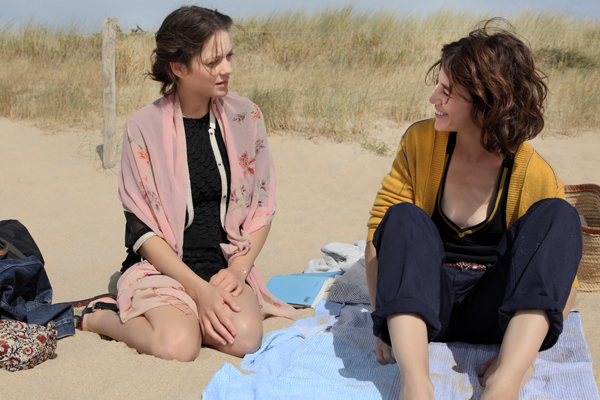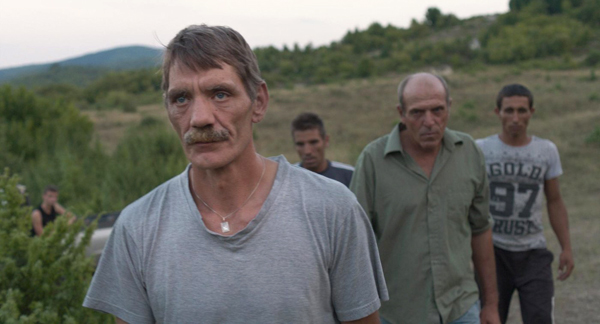Film fans are flocking to the 55th New York Film Festival now through October 15 for what the programmers at the Film Society of Lincoln Center boast as the best in world cinema. Among the main slate of films are depictions of macho men, a struggling single mother, a supernatural college student, a tortured artist, and ardent animal activists.
Manhood is the theme of German director Valeska Grisebach’s Western, which takes place in the Bulgarian countryside, where German workers are constructing a hydroelectric power plant. The title refers to the American Western genre, in its portrayal of advancement on a new land and its indigenous people. The macho leader of the group, Vincent (Reinhardt Wetrek), and his cohorts butt heads with one of the new workers, Meinhard (Meinhard Neumann), whose effortless intermingling with the locals, quiet masculinity, and position of “violence isn’t my thing” threaten their testosterone-fueled behavior.
Vincent’s disregard for others leads to a careless accident with Meinhard’s beloved horse that strains tensions further with the nearby villagers, and his crude flirting with a local woman becomes a sore point when Meinhard ends up dating her. Language is a barrier at every turn, as the Bulgarians and Germans pantomime their words or speak without being understood. Filtering every experience through the law of the jungle—from drinking rakia to playing cards to water rights—the men live in a world of “eat or be eaten.” Directing with a lyrical touch that contrasts with the brutish theme, Grisebach’s slowly paced, observational film is exceptional, for its cast of nonprofessional actors and its interpretation of the culture of machismo.
From Alain Gomis, a French director of Guinea-Bissauan and Senegalese descent, Félicité is an enlightening story that details life in central Africa, where bottles and car parts supplement traditional instruments for a popular nightclub band. Set in a milieu of musicians in the Democratic Republic of the Congo, cabaret singer Félicité (Véro Tshanda Beya Mputu) must put aside her pride when her son is critically injured in a motorcycle accident and find a way to pay for the exorbitant cost of his care. Once considered the enviable knockout in the village, she turns to collecting old debts and begging for help. She stops at nothing, including forcing herself into a gated mansion to appeal to a wealthy gangster.
Mputu is majestic. Félicité embarks on a mysterious nighttime journey that includes a dreamlike ramble through the forest where she exchanges glances with an okapi, the unusual zebra/giraffe–like mammal native to the region. Her admirer, Tabu (Papi Mpaka), a refrigerator repairman, finds an in with her as he attempts to fix her frig in a comic thread that runs throughout. (It never works.) Tabu, clearly smitten, reads her love poems and eventually wears her down. For the film and for Félicité, satisfaction comes in unique and unexpected ways.
Thelma portrays a different kind of portrait, this time a Norwegian student who develops supernatural powers. As she begins college away from home in Oslo, her controlling, conservative Christian parents continue their psychological grip on her. Unsettlingly, her mother (Ellen Dorrit Petersen) stalks her on Facebook and memorizes her class schedule to keep tabs on her and grill her for verification. Her father (Henrik Rafaelsen), kindly and understanding on the surface, demonstrates the sensation of what it’s like to burn in hell by coaxing her hand into a flame, as seen in a flashback.
Thelma (Eili Harboe) has internalized her parents’ strict rules, which are hampering her burgeoning social life. When she’s overtaken by a seizure at the school study hall, while black birds simultaneously strike the windows, the horror begins. Her condition does not stem from epilepsy but from a paranormal manifestation of deep-seated feelings, including an attraction to a female classmate, Anja (Okay Kaya). Directed by Joachim Trier (Reprise, Louder Than Bombs) in a spare style, the odd, disturbing film is visceral but ultimately unsatisfying, as it doesn’t go far enough in unleashing otherworldly forces or in developing Thelma’s burgeoning, yet underwritten, relationship with Kaya. Thelma is the Norwegian submission for the best foreign language film Oscar.

Marion Cotillard, left, and Charlotte Gainsbourg in Ismaël’s Ghosts (Jean-Claude Lother/Magnolia Pictures)
A longtime favorite at the New York Film Festival, Arnaud Desplechin (Kings & Queen, My Golden Days) is back with Ismaël’s Ghosts, a cinematic cup that runneth over with characters, scenarios, and themes in nonlinear form. Ismaël (Mathieu Amalric) is a movie writer/director with life struggles that feel like a waking nightmare. His wife, Carlotta (Marion Cotillard), disappeared without a trace 20 years ago, and his current spy thriller is being derailed by personal demons. When Carlotta suddenly appears at the vacation beach house and confronts his new girlfriend, Sylvia (Charlotte Gainsbourg), a love triangle ensues.
Once too obsessed with film and theater to properly care for his fragile, sensitive wife, Ismaël now considers trying again, to the dismay of Sylvia, an independent minded astrophysicist. Meanwhile his espionage film-within-the-film, which revolves around the international intrigue and hijinks of his brother Ivan (Louis Garrel), is packed with so many outlandish details that its veracity is in question.
Desplechin’s inspiration from and references to artists such as Jackson Pollock, Bob Dylan, Alfred Hitchcock, and John Le Carré (as well as characters from his previous films) make Ismaël’s Ghosts an enjoyable ride, with fine acting all around, but the story is too overstuffed to cohere, and its shifting time line gets tiresome. Twenty minutes longer than the version that screened on the opening night of the Cannes Film Festival, this “director’s cut” certainly has the filmmaker’s personal stamp.
Animal cruelty sets in motion a revenge plot that brings to justice the abusers in Spoor, by veteran Polish filmmaker Agnieszka Holland (Europa, Europa; Darkness) and her daughter, Kasia Adamik. In a nuanced characterization, Agnieszka Mandat, as Duszejko, gives a tour-de-force performance as a retired engineer and animal activist whose rare humanity and intelligence are complicated by impulsivity and unorthodox beliefs.
Residing in a cabin with her beloved dogs in the backcountry of the Polish-Czech border, Duszejko lives a three-dimensional life of resistance and romance, hysteria and generosity. Hunting is the favored sport of the area. Over time, corrupt sportsmen have developed an illegal practice that includes setting snares, poaching, cage breeding, and trophy hunting. When a series of hunters die mysteriously, the police point a finger at Duszejko, who has been vocal about the wrongdoings, but it appears that perhaps the animals themselves are avenging their own kind. With a band of like-minded supporters, including a card-carrying mushroom forager (Wiktor Zborowski) and a Czech entomologist (Miroslav Krobot), earth mother Duszejko fights for all living creatures and is spiritually rewarded for it.
Spoor won the Silver Bear at the Berlin Film Festival and is the Polish submission for the foreign language Academy Award. Sensitive souls may find the animal bloodshed hard to watch, but others will find solace in this full-bodied environmental thriller.








Leave A Comment